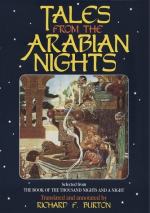[FN#307] Arab. “Khaznah"=a thousand purses; now about 5000. It denotes a large sum of money, like the “Badrah,” a purse containing 10,000 dirhams of silver (Al-Hariri), or 80,000 (Burckhardt Prov. 380); whereas the “Nisab” is a moderate sum of money, gen. 20 gold dinars=200 silver dirhams.
[FN#308] As The Nights show, Arabs admire slender forms; but the hips and hinder cheeks must be highly developed and the stomach fleshy rather than lean. The reasons are obvious. The Persians who exaggerate everything say e.g. (Husayn Vaiz in the Anvar-i-Suhayli):—
How
paint her hips and waist ? Who saw
A
mountain (Koh) dangling to a straw (kah)?
In Antar his beloved Abla is a tamarisk (T. Orientalis). Others compare with the palm-tree (Solomon), the Cypress (Persian, esp. Hafiz and Firdausi) and the Arak or wild Capparis (Arab.).
[FN#309] Ubi aves ibi angel). All African travellers know that a few birds flying about the bush, and a few palm-trees waving in the wind, denote the neighbourhood of a village or a camp (where angels are scarce). The reason is not any friendship for man but because food, animal and vegetable, is more plentiful Hence Albatrosses, Mother Carey’s (Mater Cara, the Virgin) chickens, and Cape pigeons follow ships.
[FN#310] The stanza is called Al-Mukhammas=cinquains; the quatrains and the “bob,” or “burden” always preserve the same consonance. It ends with a Koranic lieu commun of Moslem morality.
[FN#311] Moslem port towns usually have (or had) only two gates. Such was the case with Bayrut, Tyre, Sidon and a host of others; the faubourg-growth of modern days has made these obsolete. The portals much resemble the entrances of old Norman castles—Arques for instance. (Pilgrimage i. 185.)
[FN#312] Arab. “Lisam”; before explained.
[FN#313] i.e. Life of Souls (persons, etc.).
[FN#314] Arab. “Insanu-ha"=her (i.e. their) man: i.e. the babes of the eyes: the Assyrian Ishon, dim. of Ish=Man; which the Hebrews call “Babat” or “Bit” (the daughter) the Arabs “Bubu (or Hadakat) al-Aye”; the Persians “Mardumak-i-chashm” (mannikin of the eye); the Greeks and the Latins pupa, pupula, pupilla. I have noted this in the Lyricks of Camoens (p. 449).
[FN#315] Ma’an bin Za’idah, a soldier and statesman of the eighth century.
[FN#316] The mildness of the Caliph Mu’awiyah, the founder of the Ommiades, proverbial among the Arabs, much resembles the “meekness” of Moses the Law-giver, which commentators seem to think has been foisted into Numbers xii. 3.
[FN#317] Showing that there had been no consummation of the marriage which would have demanded “Ghusl,” or total ablution, at home or in the Hammam.
[FN#318] I have noticed this notable desert-growth.
[FN#319] ’The “situation” is admirable, solution appearing so difficult and catastrophe imminent.




